Naming ionic compounds - Study guides, Class notes & Summaries
Looking for the best study guides, study notes and summaries about Naming ionic compounds? On this page you'll find 203 study documents about Naming ionic compounds.
Page 3 out of 203 results
Sort by
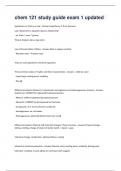
-
chem 121 study guide exam 1 updated Rated 100% Correct!!
- Exam (elaborations) • 5 pages • 2024
- Available in package deal
-
- $7.99
- + learn more
Hypothesis vs Theory vs Law - Answer-Hypothesis: If, then, because Law: Statement or equation about a relationship - ex: force = mass * gravity Theory: Explains why a law exists Law of Conservation of Mass - Answer-Mass is always constant - Reactant mass = Product mass They are used (upheld) in chemical equations Three common states of matter and their characteristics - Answer-- Solid (s): color - Liquid (aq): melting point, solubility - Gas (g): Difference between Elements, Compounds,...
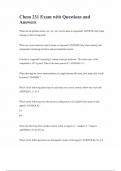
-
Chem 231 Exam with Questions and Answers
- Exam (elaborations) • 10 pages • 2024
-
Available in package deal
-
- $7.99
- + learn more
Chem 231 Exam with Questions and Answers When are the prefixes mono-, di-, tri-, etc. used to name a compound? ANSWER Only when naming covalent compounds When are roman numerals used to name a compound? ANSWER Only when naming ionic compounds containing transition and post-transition metals Consider a compound containing 3 carbon atoms per molecule. The molar mass of the compound is 167.9 g/mol. What is the mass percent C? ANSWER 21.5 When drawing the Lewis representation of a single...
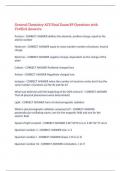
-
General Chemistry ACS Final Exam 89 Questions with Verified Answers,100% CORRECT
- Exam (elaborations) • 6 pages • 2024
-
- $11.39
- + learn more
General Chemistry ACS Final Exam 89 Questions with Verified Answers Protons - CORRECT ANSWER defines the element; positive charge; equal to the atomic number Neutrons - CORRECT ANSWER equal to mass number-number of protons; neutral charge Electrons - CORRECT ANSWER negative charge; dependent on the charge of the atom Cations - CORRECT ANSWER Positively charged ions Anions - CORRECT ANSWER Negatively charged ions Isotopes - CORRECT ANSWER when the number of neutrons varies but i...
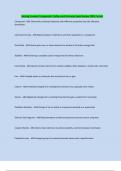
-
Naming Covalent Compounds: Prefixes and Formulas Exam Review 100% Correct
- Exam (elaborations) • 3 pages • 2024
-
- $10.99
- + learn more
Naming Covalent Compounds: Prefixes and Formulas Exam Review 100% Correct Compound - ANS-Chemically combined elements with different properties than the elements themselves Chemical Formula - ANS-Representation of elements and their quantities in a compound Octet Rule - ANS-Atoms gain, lose, or share electrons to achieve a full outer energy shell Stability - ANS-Achieving a complete outer energy level of valence electrons Ionic Bonds - ANS-Atoms transfer electrons to achieve stability, of...
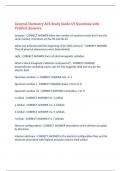
-
General Chemistry ACS Study Guide 69 Questions with Verified Answers,100% CORRECT
- Exam (elaborations) • 5 pages • 2024
-
- $11.19
- + learn more
General Chemistry ACS Study Guide 69 Questions with Verified Answers Isotopes - CORRECT ANSWER when the number of neutrons varies but it has the same number of protons ex) Ne-20 and Ne-22` What was believed until the beginning of the 20th century? - CORRECT ANSWER That all physical phenomena were deterministic Light - CORRECT ANSWER Form of electromagnetic radiation What is electromagnetic radiation composed of? - CORRECT ANSWER perpendicular oscillating waves, one for the magnetic f...
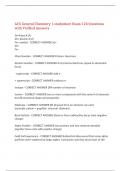
-
ACS General Chemistry 1 studysheet Exam 124 Questions with Verified Answers,100% CORRECT
- Exam (elaborations) • 10 pages • 2024
-
- $11.99
- + learn more
ACS General Chemistry 1 studysheet Exam 124 Questions with Verified Answers 56=Mass # (A) 26= Atomic # (Z) Fe= symbol - CORRECT ANSWER 56= 26= Fe= Mass Number - CORRECT ANSWER Proton+ Neutrons Atomic Number - CORRECT ANSWER # of protons/electrons (equal in elemental form) - superscript - CORRECT ANSWER Add e- + superscript - CORRECT ANSWER subtract e- Isotope - CORRECT ANSWER Diff number of neutrons Isomer - CORRECT ANSWER two or more compounds with the same # of elemen...
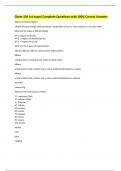
-
Chem 104 1st exam|Complete Questions with 100% Correct Answers
- Exam (elaborations) • 24 pages • 2024
-
- $13.50
- + learn more
Chem 104 1st exam|Complete Questions with 100% Correct Answers What are hybrid orbitals? orbitals of equal energy produced by the combination of two or more orbitals on the same atom What are the types of hybrid orbitals SP- 2 regions of density SP^2- 3 regions of density(3sp^2s) SP^3- 4 regions (4 sp^3s) What are the 4 types of hydrocarbons alkanes, alkenes, alkynes, and aromatic hydrocarbons Alkane a hydrocarbon containing only single covalent bonds Alkene a hydrocarbon that contai...
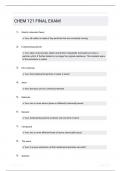
-
CHEM 121 FINAL EXAM
- Exam (elaborations) • 12 pages • 2024
-
- $14.49
- + learn more
CHEM 121 FINAL EXAM! kinetic molecular theory fundamental particle h2o molecule atom molecule element compound the same solution density atomic number mass number isotope atomic mass alkali metals alkali earth halogens properties of metals properties of non metals avagadros number ionic bond covalent bond naming covalent compounds naming ionic compounds properties of ionic compounds percent composition ionic empirical formula molecular formula precipitate
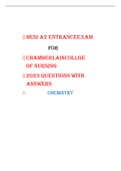
-
HESI A2 CHEMISTRY-CHRISJAY FILES (1) (1)
- Exam (elaborations) • 54 pages • 2023
-
- $14.99
- 1x sold
- + learn more
HESI A2 ENTRANCEEXAM FOR CHAMBERLAINCOLLGE OF NURSING 2023 QUESTIONS WITH ANSWERS CHEMISTRY HESI A2 CHEMISTRY V1/V2 FILE 1. If a Hydrogen isin a compound, what would its oxidation number be? +1 2. What isthe oxidation number of any simple ion? +1 or -1 depending on the charge of the ion 3. How many kilograms are in a pound? 0. kg 4. What is the temperature for freezing point of water in Celsius? 0 degrees Celsius (32°F for Fahrenheit) 5. What is the conversion of Celsius to Fah...
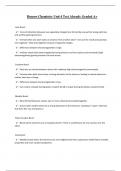
-
Honors Chemistry Unit 4 Test Already Graded A+
- Exam (elaborations) • 6 pages • 2024
-
Available in package deal
-
- $9.49
- + learn more
Honors Chemistry Unit 4 Test Already Graded A+ Ionic Bond: ️ Force of attraction between two oppositely charged ions formed by one particle losing electrons and another gaining electrons. ️ Formed when one atom takes an electron from another atom—ions are the result (one positive, one negative)—they stick together because of opposite charges. ️ Difference between electronegativities is high. ️ Involves metals (low electronegativity) losing electrons to form cati...

That summary you just bought made someone very happy. Also get paid weekly? Sell your study resources on Stuvia! Discover all about earning on Stuvia


